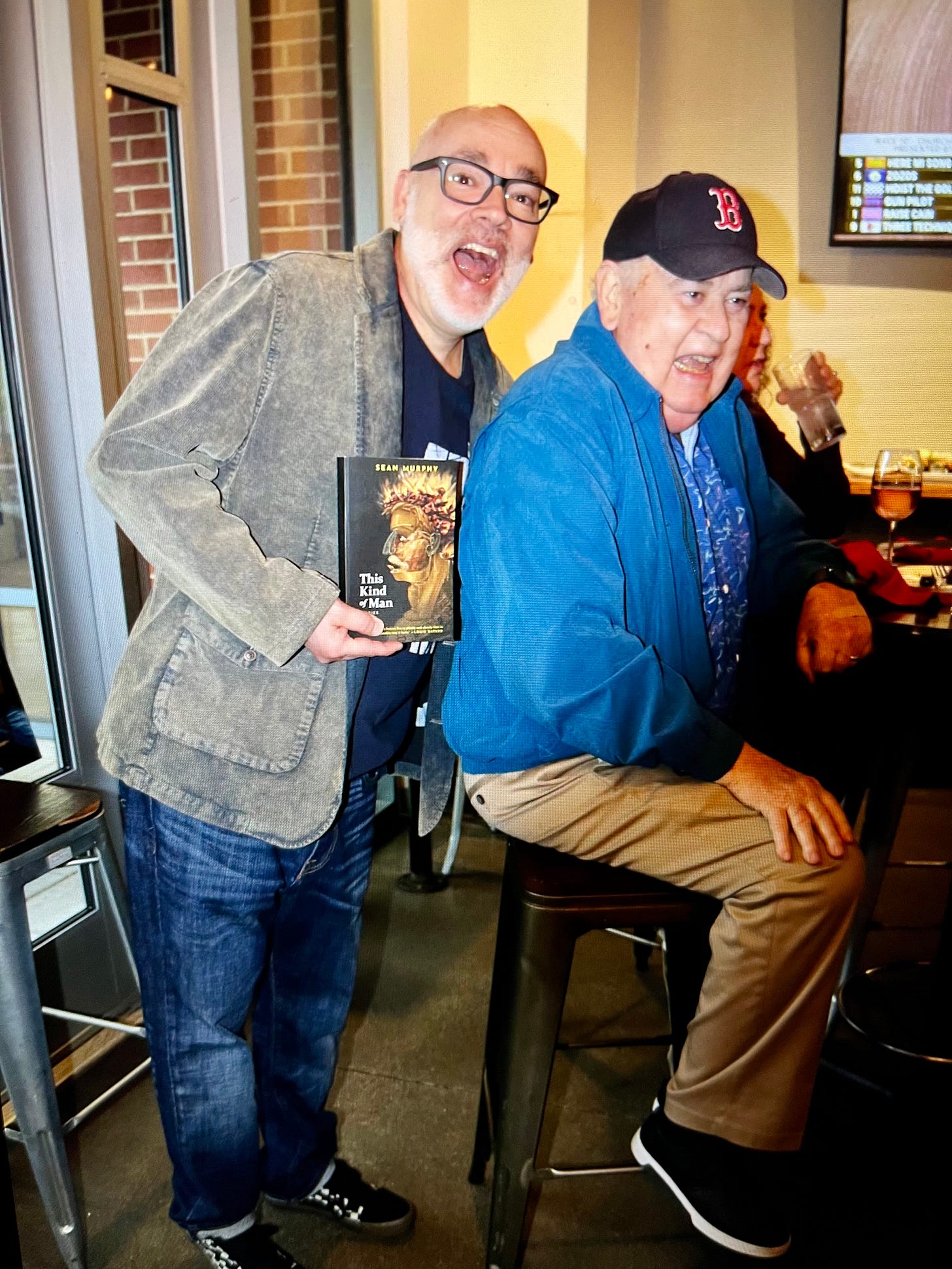I Know Why The Caged Bird Doesn't Sing
Hearing what our fathers are (and aren't) saying
The stories in Sean Murphy’s extraordinary collection This Kind of Man are swift, sharp, sometimes harsh, often sad, but so absolutely, transcendentally honest that the final effect is thrilling, a form of liberation. I know of no other eulogy for the post-war American male that so deftly captures the mingled love and anger of fathers and sons. —Robert Anthony Siegel, author of Criminals: My Family’s Life on Both Sides of the Law
My father, like so many from of his generation, is a man of few words. These are men who, according to their fathers, never knew how tough things used to be. This exceedingly gradual progress, one generation at a time, says much about both evolution and America.
Men from what we call the old school were taught to handle their business: they changed their oil, mowed their lawns, fixed leaky faucets, and acted as the rock-like foundations upon which their families were built. Feelings were, for the most part, feminine things; emotions served to weaken men’s resolve and were, therefore, to be avoided at all costs. Growing up, I thought it was a Boston thing, then I figured it was an Irish Catholic thing. Eventually, I understood it was just a man thing.
As the 20th Century—decades of unprecedented innovation, accomplishment, and carnage—wound down, Americans at last began grappling with the reality that many of our received notions of manhood and masculinity are not only broken, but inculcated—from the beginning and by design—to ensure willing participation in a system where the overwhelming majority are excluded from the start. We witness the way these dysfunctions are handed down like inheritance, and how every cliché, from fighting to drinking to intolerance of dissent and distrust of others, is a carefully constructed trap, preventing solidarity, empathy, and love (for others, for oneself).
How much global miscommunication and injustice is the simple, inevitable result of a general lack of empathy? This is part and parcel a result of the ways we traditionally have associated toughness with strength and making every aspect of life a competition. We see the ways this plays out in the political sphere: now, acknowledging any error or misstatement or—heaven forbid, mistake—is anathema; giving an inch a fatal flaw. This, of course, is precisely the opposite of how it should be. This illustrates the ways toxicity is impacting all areas of life, so even as we've made welcome and overdue advances in terms of inclusivity (in the workplace, on campus, etc.), aggression and superficial demonstrations of "strength" are always evolving, and actively being utilized by people in powerful places.
The subsequent generations have undeniably been kinder, and gentler. And yet, why does it seem like everyone is angrier than ever? There are, of course, many reasons, but aside from the frustrations about employment, debt, relationships, and feelings of being left behind, we would benefit greatly from a deeper examination of why certain narratives are pushed precisely to amplify and appropriate this anger. That this vitriol increasingly leads to explosions of violence needs to be better understood in the context of a deadening culture and the false narratives of an exploitative, zero-sum game capitalist model, where those without are encouraged to quarrel with similarly overworked and underpaid, mostly blue-collar workers.
All one need to do is read the news to find ample evidence of intolerance, mendacity, greed, and ill-will—and despair, accordingly. But engaging with the world, working and living amongst human beings who have been hurt, who struggle, who can’t catch that break, who’d love nothing more than an opportunity to thrive, obliges one to judge warily, and find ways to cultivate empathy, even for the inexplicable.
Hurt people, it’s said, hurt people. If we’ve managed to fathom anything about masculinity and its associated toxicities, we know that more hardness won’t help. we scoff at or judge men from a particular generation who feel betrayed when it’s too late to change? Or do we give them grace, and try to learn hard lessons from the hard lives they’ve lived? Offering a hand, lending an ear, spending some time, showing some love: these gestures, so often in short supply, especially amongst certain types of men, will not miraculously make things right. But they are necessary and overdue. They are the first step toward healing.
Can even the most misspent life offer lessons? If we refuse to make the same mistakes, doesn’t this defiance signify a sort of progress? If we grudgingly acknowledge the loss of those who couldn’t—or wouldn’t—be helped, might we cultivate our indignity to prevent further injustice?
In This Kind of Man, Sean Murphy excavates the complicated, tender, wild truth of what it is to be a man across generations and relationships. His wistful, funny, precise honesty lights up the page and helps the reader see the complexity of the filter of maleness. An insightful and necessary book.
—Karen E. Bender, author of Refund, Finalist 2015 National Book Award




So that's what's been bothering us! I once, after the funeral of a child, sat in a limo with my Dad, my brother and a friend. The two young men sobbed for about 5 minutes--well, a long time. My greatest generation, WWII Vet Dad didn't try to stop them but sat with them and then quietly told a story, which I can't remember. It was an extraordinary moment. It was a lovely moment in all our sadness and I've always been proud of and impressed by my Dad's response.